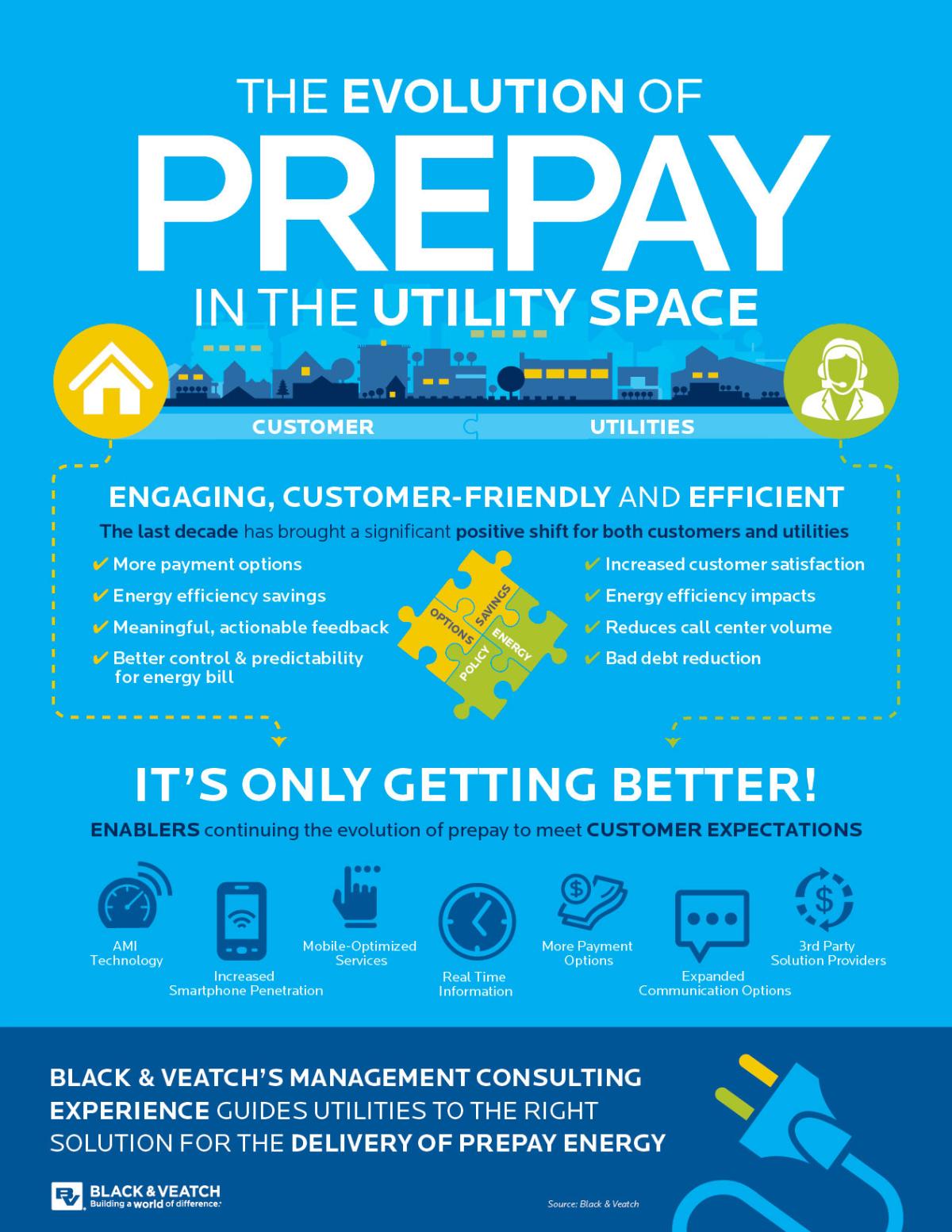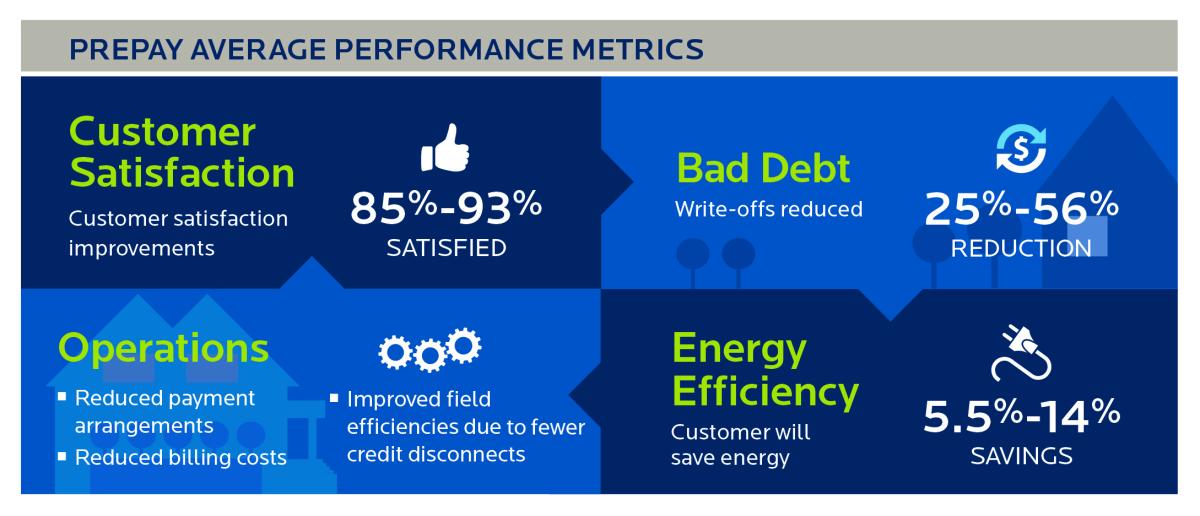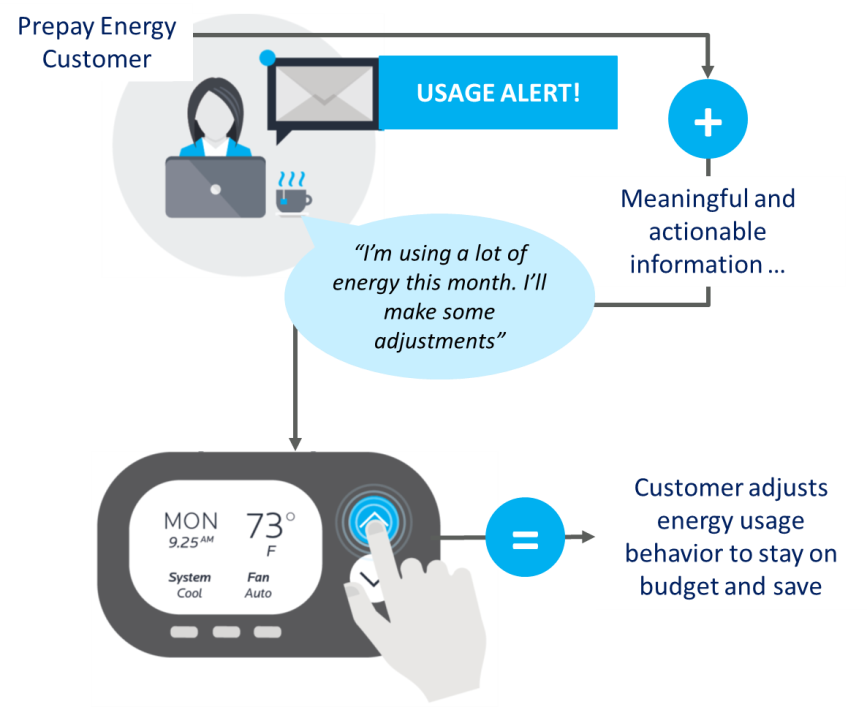Prepay Energy as a Gateway for Customer Engagement
Prepay energy services have emerged as a viable alternative to traditional utility services, with notable benefits for both the utility and the customer.
Paul Rice, Principal, Black & Veatch Management Consulting
The concept of prepay, even in the utility space, is not new. Historically, these solutions have been viewed as very utility-centric by nature, focused on solving very specific challenges that were seen as problematic or negative. It was challenging for customers to keep track of their balances, and they had to put forth a relatively high level of effort to make payments and recharge their accounts. The result is that prepay was seen as complex and cumbersome.
So what has changed? It’s not enough for technology to simply evolve and mature, for advancement means little unless it aligns with customer needs and expectations. What was once a service focused on addressing the needs of the utility has shifted over time to offer a balanced set of benefits that address the needs of both the utility and the customer. This is due largely to the convergence of key enablers such as:
- Advanced Metering Infrastructure (AMI) Networks
- Smartphone Adoption
- Growth in Mobile-Optimized Payment Solutions
- Change in Customer Needs and Expectations
The bar has been raised, and customers expect more options, flexibility and visibility regarding the services they receive. From online banking, home security and cell phone prepay plans to smart phones, ecommerce and expanding payment options, customers now consider on-demand and near real-time services the norm – not the exception.
Prepay Benefits
A well-constructed prepay energy program offers the utility and the customer demonstrated benefits. Figure 1 provides a sampling of typical benefits experienced by the utility and prepay energy customer based on Black & Veatch’s direct research, publically available case studies and excerpts from various municipal and cooperative utilities that have implemented prepay energy programs.
The Role of Energy Efficiency in Prepay
It has become increasingly important for the customer to play an active role in realizing energy reductions and savings, and a partnership between the customer and their energy provider is necessary to deliver benefits for both. Customers must be empowered with the information, tools and motivation to establish and sustain changes in how they think of and use energy. Because customers see the dollar effect of their energy use each day, prepay is one of the few energy efficiency (EE) initiatives with a visible correlation to the bill. Unlike a typical monthly bill, prepay customers have a clear understanding of how much their energy cost them the previous day, and have an opportunity to respond proactively in order to curb costs and stay within their budget for the month. As a result, EE measures that tie closely to a customer’s bill are going to see the greatest long-term success.
This “near real time” view of energy costs – along with the flexibility to make payments timed to their budget requirements – provides customers with transparency and opportunities to better predict and manage their energy costs. For utilities, recognizing the EE benefits can help support the business case for a prepay offering. Paired with improved customer satisfaction, operational benefits and debt reduction, the benefits for both the utility and the customer become increasingly clear.
Policy Considerations
Utilities establishing prepay energy programs will face a number of policy issues that will need to be carefully thought through to determine implications to regulators, customer advocates, internal resources, procedures and customers. Policies should be aligned with the prepay energy program strategy and objectives. For example, typical policies that utilities should consider include disconnect and reconnect restrictions/rules, program type (rate vs. billing option), fees, payments, balances and de-enrollment.
A Platform for Customer Engagement
Utilities are prioritizing partnerships with their customers. According to the 2016 Black & Veatch Strategic Directions: Smart City/Smart Utility Report, nearly two-thirds of respondents indicated their utility seeks direct ownership of the customer relationship. Establishing and maintaining meaningful and regular engagement is key to this objective. By providing feedback and education tied directly to the bill, prepay creates a regular dialog between the utility and the customer that is both useful and actionable.
Utilities can then expand upon this interaction by creating opportunities to help customers identify additional ways to enhance the service they receive. Furthermore, the overall quality of engagement improves. Having important information at their fingertips reduces the time customers need to spend on the phone with their utility and makes those interactions more positive and productive. As a result, the customer and the utility see direct benefits in the quality of the engagement as well as new opportunities to create value for both.
The Future of Prepay
It will be important for utilities to recognize the opportunity for prepay’s broader appeal. Enabled by the catalyst of the “mobile first” movement, connected devices and infrastructure, and evolving customer expectations, prepay is positioned to act as a “gateway” product for a growing number of customers. It can create opportunities for add-on services over time, such as time variable rates and in-home connected devices.
A prepay energy service won’t appeal to everyone. However, the benefits will resonate with many customers that are more comfortable with mobile-optimized services or who want to stay informed and have more control over how they pay for their energy use. As part of a broader portfolio, prepay offers value that will help establish and improve engagement between the utility and their customers. By balancing the needs of the utility and the customer, it will deliver benefits and success for both.
Additional Contact
David Glenwright, Principal, Black & Veatch Management Consulting




